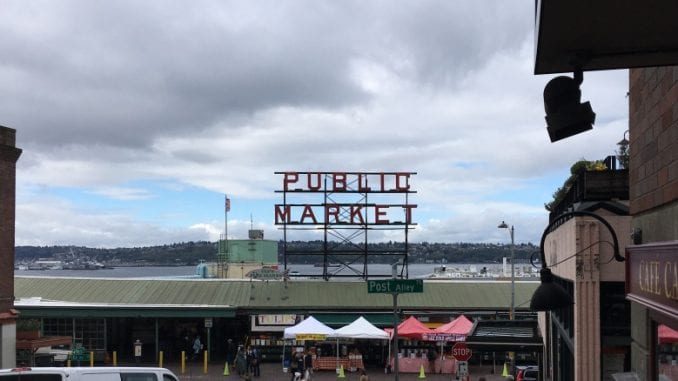
Now that the 2017 United States Barista Championship is over, we reflect on what it means to be a barista champion.
BY ASHLEY RODRIGUEZ
BARISTA MAGAZINE ONLINE
Last weekend, Seattle hosted the 2017 Global Specialty Coffee Expo—pretty much one of the biggest coffee events in the world. Expo brings together businesses, roasters, exporters, and coffee professionals from all over the globe to share ideas and drink coffee. Expo also hosted the United States Coffee Championships, including the U.S. Barista Championship, which I had the honor to compete in this year.
If you’ve followed Barista Magazine’s online coverage of competition—from our series aimed at first-time competitors to our most recent string of articles highlighting tips and tricks from past competitors—you know I’ve been active in the competition scene. I competed both this year and last, making it to the semi-finals round both years. Last year was exhilarating: I competed in the first round of 24 and was one of the six chosen to move on. I was so honored to be included in a group of diverse and exceptional baristas like Michael Harwood of Ceremony Coffee Roasters, Andrea Allen of Onyx Coffee Lab, and Casey Solaria of Intelligentsia. I couldn’t have been happier with my peers, with my judges, or with my industry.
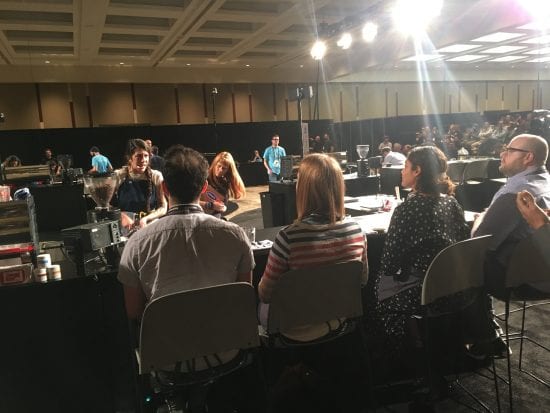
If I’m being totally frank, this year was … different. After receiving a bye through placing fourth at the Austin CoffeeChamps qualifier, I competed in the second round of this year’s USBC. It’s hard for me to write this—because I feel a little sad and a little embarrassed—but I placed last amongst the semi-finalists. Along with that, I was also disheartened by the group of baristas who qualified from the first round into the second round. I wasn’t hurt or upset by any of the individual baristas themselves, who are all qualified and talented coffee folks in their own right, but I was upset by the people who were not part of the group—namely, women.
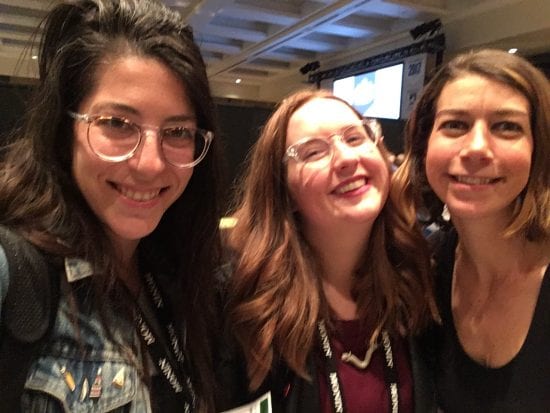
All of these experiences made me think about why I compete and why barista competitions matter. Every year, competitors work hard and practice countless hours to potentially win the title of the best barista in the nation. But what does it actually mean to be the best barista in the nation? Once you win the title, what do you do? I asked a lot of competitors and baristas this question, and none of us could really come up with a definitive answer. The rulebook states that the judges are looking for an ambassador of specialty coffee to represent the United States, so how do we translate that into action? What should we be looking for from our champions?
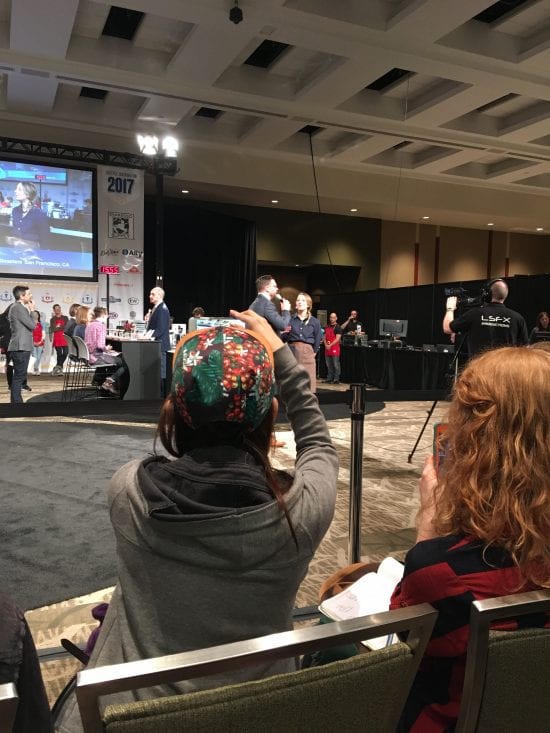
Speaking from my own experience, I hope for a champion who can push baristas and first and foremost be an advocate for future competitors. Every year, I learn something new from my judges and my fellow competitors, and I hope for a champion who can share their experiences and reach out to potential competitors. I also hope for a champion who can think critically about their position within the coffee industry and work with other leaders to make coffee better. I’m inspired by people like Charles Babinski of G&B Coffee and Go Get Em Tiger, the 2015 USBC champion, who was in the competitor’s room trying espresso and who I was lucky enough to talk with about issues of gender inequity. I’m also inspired by Ben Put of Monogram Coffee, the longtime barista champion of Canada, who has offered help to any competitor who wants input or advice competing. I hope to see more competitors who share information and make the pathway to competition possible for more people—and for more diverse groups of people.
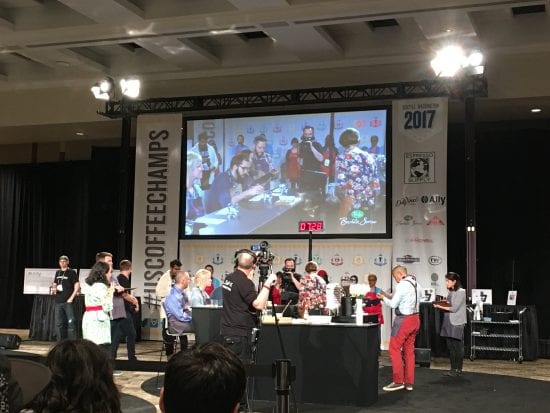
Whether you’re in the competitors room, polishing your glassware, or in the audience watching other competitors, it’s impossible to not ask others who they want to see win. And I heard a lot of different responses from a lot of people from all over the coffee industry. People shared with me the things that their favorite competitors talked about: commitment to service, giving back to baristas, standing up for your staff—and I hope to see more of this actualized in the next year. I think we’re still unclear what our barista champions should offer the larger community, but it’s a topic I want to explore more in the coming year, and something I want to hear more about from our readers. Now that we’ve crowned our newest barista champion (Kyle Ramage of Mahlkönig), I’d love to see our community brainstorm how we want our leaders to use their year as the champion.
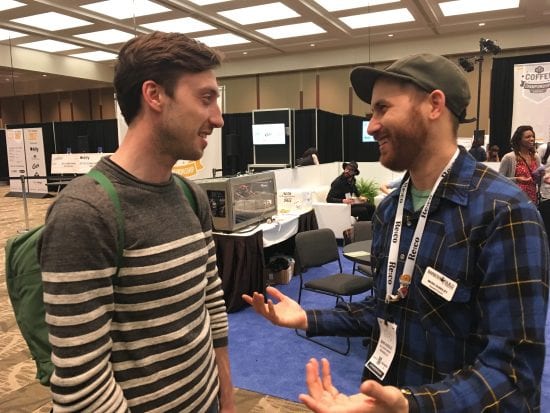
This weekend, I’ve felt disheartened and discouraged, excited and engaged. There’s a lot I want to share about my time at USBC and at Expo, and I hope to hear from all of you about your experiences and stories. Barista Magazine is, first and foremost, a publication meant to reflect the diversity of our community, and I want this platform to echo that.
Thank you to everyone who’ve read my series on competition, who rooted me on throughout this process, and who I had the pleasure of meeting for the first time at Expo. Events like this, no matter how successful I am personally, remind me why I care so much about coffee and what drives me to always do better.


Sal,
This “special snowflake” and “SJW” stuff is horseshit. You’re the one worried about the status of the white man here. And, as a white man in Specialty coffee myself, I can tell you: we’re sitting pretty. I can only imagine the kind of weakness that would make you feel threatened in this situation.
Second, have you been to a coffee industry event? Seeing calls for more diversity and inclusion and being scared that we’ll drive too many people out and not seeing the opportunity for all the people we could bring in to grow our community is completely absurd. I am excited for a future in which leaders like Ashley continue to push your pro-white (or whatever) politics out of this industry.
Perhaps if you had spent more time practicing the craft of specialty coffee and less time preaching and peddling gender politics you might have had a chance at a win this year. As soon as I saw who had won I knew it would only be a matter of time until the specialty coffee ‘feminist and SJW’ branch began to bring its special snowflake form of gender politics into the mix. It’s this exact kind of group-think, endlessly pushing anti-white and gender politics into the specialty coffee community that will eventually cause some to feel excluded and will lead to fewer people wanting to buy subscriptions, less SCAA/BGA memberships, and ultimately a splinter of the community into fractions. How will that help anyone, and especially anyone at the source level of the chain from seed to cup?